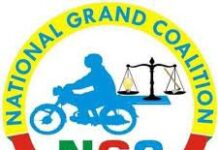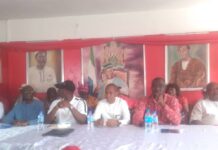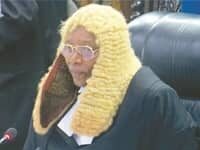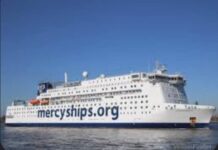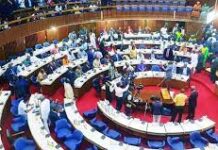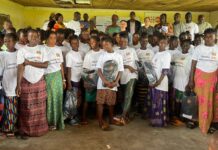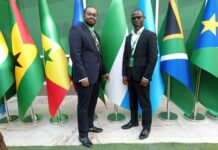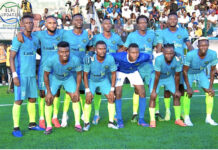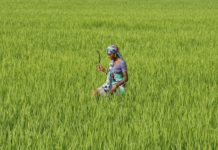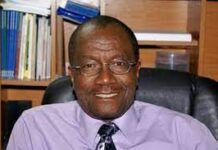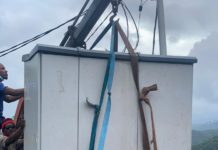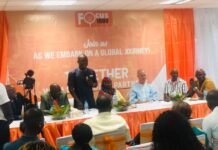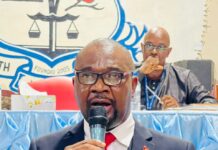21 SCARY THINGS ABOUT CYBERCRIME BILL
Continued from last Edition
According to the interpretation section of the Act, the word “person” is defined to include among other things, ‘a natural person, a corporation, company, partnership, firm, association or societies’.
This shows that political parties, civil society organizations, media houses and other interest bodies are not exempted from liability under the Act.
 In a democratic society where political parties, civil society organizations and media practitioners play a leading role in holding government accountable, serving as watchdogs and raising awareness on it excesses, this may be quite worrying indeed.
 With such provisions, the Cybercrime Bill may be used as a weapon by the ruling government to suppress opposition parties, journalists and civil society organizations that are critical of its policies and programmes.
There is need for the scope of the Bill to be narrowed down to individual persons.
Where it is necessary for the Bill to have jurisdiction on corporations, companies, partnerships, firms and associations, clear-cut guidelines must be stated under the Bill to protect political parties, civil society organizations and media houses from being suppressed and invaded illegally.
The Bill also sets out to invade into the private rights and activities of Diasporans
Under section 13 and 14 of the proposed Bill for example, the Attorney General and Minister of Justice of the Republic of Sierra Leone is empowered to request from a foreign state assistance that is aimed at investigating or prosecuting offences under this Act; or collecting electronic evidence related to an offence punishable under the laws of Sierra Leone.
By section 14 (2), the Attorney General and Minister of Justice of the Republic of Sierra Leone ‘shall communicate directly with the appropriate authority of a foreign state responsible for sending, answering, executing or transmitting requests for mutual assistance or extradition.’
With such provisions under the Bill, it is certain that the activities of diasporans are no longer immune from invasion by the government of Sierra Leone.
Dissenting voices and groups in the diaspora who may be critical of government’s policies and programmes will be of serious target under this bill.
The bill must ensure adequate safeguards for dissenting opinions and critical voices residing in the diaspora to prevent a violation of their civil rights and liberties.
The Cybercrime Bill makes room for foreign interference, breach of security, public interest and territorial sovereignty of Sierra Leone
By section 18 of the Bill, “a foreign state may request or obtain the expeditious preservation of data stored by means of a computer system, located within Sierra Leone, in respect of which it intends to submit a request for mutual assistance, for the search, access, seizure, security or disclosure of the data.â€
This foreign request from a foreign state may likely prejudice public and security interests as well as the territorial sovereignty of Sierra Leone.
The Bill must ensure adequate safeguards in order for the public and security interests as well as the sovereignty of the state not to be undermined by rogue regimes abroad over the provision of grants and donor funds giving in exchange for such vital information or persons.
The proposed Bill abrogates the rules of evidence in a criminal trial
More negative still, the proposed Cybercrime Bill under section 4 deems all evidence admissible and further shifts the burden of proof to the accused person to showcase why the evidence tendered against him in court is inadmissible.
Section 4 of the said bill read thus: “In a trial of an offence under any law, the fact that evidence has been generated, transmitted or seized from or identified in a search of a computer system, shall not of itself prevent that evidence from being presented, relied upon or admittedâ€.
The above section clearly abrogates the rules of evidence in a criminal trial. It is settled law that in a criminal trial, the burden of proof rests with the prosecution. It may only shifts in exceptional circumstances.
Secondly, not all evidence is admissible in a criminal trial. But this seems not to be the case under this law.
By section 4 of the Cybercrime Bill, it appears that all evidence (generated, transmitted or seized) will be deemed admissible in the court of law.
The Act must conform to the rules of evidence applicable in criminal proceedings. It is trite law that not all evidence is admissible in a criminal trial.
The proposed Bill empowers the police or any authorized person
 for trans-border access to stored computer data without authorization
Under section 21 of the proposed Bill, the police can access without authorization, publicly available stored computer data, regardless of where the data is located geographically.
This is quite scary indeed especially for citizens living abroad (diasporans).
 Empowering the police or any authorized person to have access to the data of private citizens everywhere in the world and without authorization from them may amount to violation of their privacy rights and civil liberties.
Access to and use of public or private data of citizens by the state must be subjected to due authorization and consent from such citizens.
The composition of the National Cyber Security Advisory Council invites undue political interference into the administration of the Act
The composition of the National Cyber Security Advisory Council as enshrined under section 48 of the proposed bill clearly lays a solid foundation for undue political influence, manipulation and control in the provision of strategic leadership, oversight and guidance on implementation and development of national cyber security legal frameworks in Sierra Leone.
Listed below are the members that comprise the National Cyber Security Advisory Council:The President, the Minister of Finance, the Attorney-General and Minister of Justice, the Minister of Internal Affairs, the Minister of Foreign Affairs and International Cooperation, the National Security Coordinator of ONS, the Director-General of Central Intelligence and Security Unit, the Chief of Defense Staff of the Republic of Sierra Leone Armed Forces, the Inspector-General of Police, the Director-General of National Telecommunications Commission, the Bank Governor, the National Cyber Security Coordinator, the Director of Communications of the Ministry of Information and Communications and the Minister of Information and Communications as Secretary.
It is interesting to note that all of the above Cyber Security Advisory Council members are key political appointees that are largely answerable to, and under the influence and control of the President of the Republic of Sierra Leone. With such kind of makeup, it is obvious that politics would loom large in the oversight, implementation and development of national cyber security legal frameworks in Sierra Leone.
The question remains: why did the composition of the Cyber Security Council not include non-political actors such as members from the Sierra Leone Association of Journalists, civil society organizations, the Sierra Leone Bar Association, Independent Media Commission etc?
The reason is simple. The proposed Cybercrime law is another trojan horse and political tool design to suppress political dissent as well as opposing voices both at home and abroad that are critical of the ruling governments.
The composition shows that the Cybercrime Bill is an apt replacement of the repealed Criminal Libel Law in fundamental terms.
The composition of the proposed National Cyber Security Advisory Council must be reduced to 7 members and these members must include representatives from civil society, the media, interest groups, women and persons with disabilities.
Inclusion of civil society organizations and interest bodies is critical to striking a balance between upholding fundamental human rights and freedoms of citizens as well as regulating cyber bullying, trafficking in persons and terrorism financing in the Cyber space.
The grounds upon which a member of the National Cyber Security Advisory Council can be dismissed from office are fluid, weak and nebulous
The proposed Cybercrime Bill under section 47 (2) (b) gives the President arbitrary and unilateral powers to nullify the membership of any member of the National Cyber Security Advisory Council if he is satisfied that it is not in the public interest for the person to continue serving as a member of the Council.
This ground of removal makes for compromise and outright loyalty of Council members to the wishes and desires of the President. It also opens room for political manoeuvring and unnecessary dismissals.
 The removal process or loss of a member status of a Council member of such an important framework must not be made weak and nebulous. It must be watertight and bullet-proofed. Besides, how does the president determines what is not in the public interest?
The loss of membership in the Advisory Council must be based on clear and reasonable grounds determined by the majority of members and not by one man alone. As a matter of fact, the president’s presence in the Council transforms the Council into another cabinet forum.
 He should therefore be taken out of the composition.
The quorum that is needed to convene a meeting of the National Cyber Security Advisory Council as well as taking decisions is not known
 The proposed Cybercrime bill does not state a specific number of members that can constitute a quorum for the Advisory Council to hold its meeting or take important decisions in a meeting.
It is anyone’s guess as to the number of members that may be required to constitute a quorum or to take valid decisions. Why did the drafters omit the number of members that can constitute a quorum for meetings to be held or decisions to be taken? Such silence leaves room for suspicions indeed.
A reasonable number of members that can constitute a quorum for meeting and decision making must be clearly enshrined in the Act.
Politics looms large in the nomination of the National Cyber Security Coordinator
 The proposed Cybercrime Bill under section 47 (1) gives the Minister power to nominate the National Cyber Security Coordinator.
However, no clear guidelines as to how this nomination will be done in a fair and non-partisan manner are stated.
In many cases, when such power is giving to a politically exposed person like the Minister without clear cut guidelines, politics will be the first motivation rather than merit.
Clear cut guidelines as to how the National Cyber Security Coordinator should be recruited must be stated in the Act.
The Cybercrime Bill is a Wolf in sheep’s clothing set up to target whatsapp, facebook, twitter and instagram users who express dissenting opinions and criticisms over government policies and programmes
By section 35 (2) of the Cybercrime Bill, ‘A person, including a corporation, partnership, or association, who knowingly or intentionally sends a message or other matter by means of a computer system or network that is grossly offensive, pornographic or of an indecent, obscene or menacing character or causes any such message or matter to be so sent, for the purpose of causing annoyance, inconvenience, danger, obstruction, insult, injury, criminal intimidation, enmity, hatred, ill will or needless anxiety to another, commits an offence.’
Many facebook, whatsapp, twitter and instagram users as well as admins of these social medial platforms who share messages that may look indecent or offensive would be under serious target by this law.
Civil society activists, journalists and opposition members are also not exempted.
Like the expunged Public Order Act, this section will lead to grave violations of fundamental human rights of citizens by the state. It will also muzzle such rights like freedom of the press, privacy, free speech, the right to assemble and associate and the right to hold opinions in a democratic society.
The Cybercrime Bill must guarantee free speech and free press as enshrined under many international and regional frameworks to which Sierra Leone is a party.
Leaks that serve the public interest or exposes corruption are even targeted under the Cybercrime Bill
By section 27 of the Bill, ‘a person, including a corporation, partnership, or association, who intentionally and without authorization intercepts or causes to be intercepted non-public transmissions of data to or from a computer system whether directly or indirectly commits an offence’.
It is therefore irrelevant as to whether such interception in the transmission of data was done in the public interest or not. Also as far as the Bill is concerned, it is even inconsequential as to whether it was done to expose corruption or not.
Media houses and practitioners like Africanist Press that engages in leaks so as to help in the exposing of corruption within the state would be seriously targeted under this Bill.
Interceptions and computer leaks that may result in the transmission of data relevant to the public interest as well as the fight against corruption should be made an exception.
Cyber/internet cafés would be required to register under NATCOM and the Corporate Affairs Commission
According to section 40 of the Cybercrime Bill, cyber/internet cafes would now be required under the Cybercrime Act to register with NATCOM and the Corporate Affairs Commission.
This change in registration requirement would not only posed an additional burden regarding registration fees but will further provide an opportunity for undue censorship and control of the cyber space as well as internet cafes by NATCOM. It will also make room for easy blockage and unlimited censoring of cyber space by state authorities.
Bringing NATCOM as a registration requirement may be risky as it might open room for abuse and undue censorship of the cyber space and social media. This provision needs to be keenly looked into.
The corporate liability provision under the proposed Cybercrime Bill may create opportunity to clamp down on the leadership of opposition political parties
Section 46 (2) of the proposed Bill states thus: “Where a natural person commits a criminal offence under this Act, for the benefit of a legal person, due to the lack of supervision or control by a natural person, the legal person shall be liable for the offence under this Act.â€
This simply means that if a member of a political party for example commits an offence under this Act, the leadership of his political party, for lack of supervision or control, may be held vicariously liable for his offences under this act.
This is ridiculous to say the least and another entrapment to get at the political leadership of political parties that may be critical of the ruling government.
This provision must be amended to reflect individual criminal responsibility for offences committed under the Act.
The leadership of political parties must be exempt from liability where they may not be aware of the acts of their supporters given their vast numbers and population size and geographic locations.
 It would be overtly impracticable for heads of political parties to supervise and have effective control of their wide spread and diverse supporters at all times.
Holders of computer passwords in public institutions and MDA’s would be under undue pressure and scrutiny
According to section 31 of the Cybercrime Bill, it states that “a person, including a corporation, partnership, or association, who intentionally or without authorization discloses to another person a password, access code or other means of gaining access to any program or data held in a computer system commits an offence.â€
 This provision puts password holders at risk in terms of their jobs. Where any breach occurs in the office even without their knowledge they would be deemed as conspirators.
Safeguards should be provided under this Act for holders of computer passwords within public institutions not to be unduly humiliated and persecuted over leaks that may have nothing to do with them.
The Proposed Cybercrime Bill undermines many international human rights laws, treaties and conventions that Sierra Leone has signed and ratified
No doubt, a cursory look at the provisions of the Cyber crime law reveals that it is a law that clearly tramples on the human rights and fundamental freedoms of citizens both within and outside of the country.
This is the case because, the Cybercrime Bill contravenes a good number of international treaties and conventions that Sierra Leone has signed and ratified such as the Universal Declaration of Human Rights (UDHR), the International Covenant on Civil and Political Rights (ICCPR), the International Covenant on Economic, Social and Cultural Rights (ICESCR) and the African Charter on Human and Peoples Rights to name but a few.
Significantly also, even the Malabo and Budapest conventions on cybercrime security have not been spared. The proposed Cybercrime Bill is not in tandem with the spirit, object and purpose of these conventions.
The provisions of the proposed Cybercrime Bill must be tailored to respect human rights and fundamental freedoms and must be in tandem with international human rights laws.
The proposed Cybercrime Bill awakens memories of the expunged Criminal Libel Law
The draconian provisions within the Cybercrime Bill, aimed at suppressing dissenting voices, opposition parties, journalists, civil society activists, the mainstream and social media and critics of the political class, bring memories of the expunged Public Order Act into the limelight.
 As a matter of fact, a leading journalist in Sierra Leone has succinctly described the Cybercrime Bill as the ‘NEW PUBLIC ORDER ACT FOR THE ELECTRONIC AGE’.
The fears expressed by civil society organizations, media practitioners and interest groups  regarding the bill has been far and wide reaching.
Little wonder why Parliament has placed a pause on the debating process and called for more sensitization to be done on the Cybercrime Bill by the government.
Provisions that make the Cybercrime Bill resemble that of the expunged Criminal Libel Law should be deleted from the bill and a more robust sensitization and engagement process with civil society organizations, media practitioners and interest groups be ensured to secure a buying- in of the framework by citizens living within and outside of Sierra Leone.
The object, spirit and purpose as well as the legitimate expectation of a Cybercrime Bill is overtly misplaced.
What is expected of a true Cyber Crime law is far removed after one would have read the Sierra Leone version.
Apart from a few plausible provisions like those dealing with child bullying, child pornography etc bulk of the majority of the provisions in the Bill seek to suppress individuals, organizations and entities that make use of electronic devices, social media or Cyber space to voice their frustrations, dissenting views and opinions against the ruling government.
The Bill largely seeks to regulate the internet and social media.
So many fundamental humans rights would be under serious threat if this CyberCrime Bill is passed into law unamended. Such rights include the right to privacy, hold opinions, assemble and associate, free speech and freedom of the press.
 A true and well-meaning CyberCrime legislation should have safeguards that protect citizens human rights and fundamental freedoms.
The legitimate expectation of any CyberCrime Bill is principally to address fraud, money laundering, theft, organized crime, forgery and terrorism related activities which are often carried out in Cyber space with intent to undermine national security and public safety.
This is the case for many Cybercrime legislations across the world including the one used in South Africa.
But a cursory look at Sierra Leone’s Cybercrime Bill would reveal that this legitimate expectation is overtly misplaced.
Rather, the Bill focused more on interfering with the private rights of Citizens both at home and abroad as they interact with the internet, social media and Cyber space on a daily basis.
The legitimate expectation of any CyberCrime Bill is to address fraud, money laundering, theft, organized crime, forgery and terrorism related activities that are often carried out in Cyber space with intent to undermine national security and public safety.
The CyberCrime Bill must therefore be amended to have adequate safeguards that will protect citizens human rights and fundamental freedoms such as the right to privacy, hold opinions, assemble and associate, free speech and freedom of the press.
Certainly, this advisory opinion has been done in good faith by LEGAL LINK so as to help ensure a more robust, fairer, human rights- friendly and objective Cybercrime bill that will not undermine and trample upon the fundamental human rights and freedoms of citizens within and outside of Sierra Leone.
It is now up to Parliamentarians and ultimately the President of the country to do the needful.
 While we commend the move by the government and in particular, the Minister of Information and Communications to push for the passing of a Cybercrime Act, we appeal that our advisory opinion piece be given due attention as it does not portend, seek or aim to undermine the passing of such a law in the country.
Rather, it advocates, promotes and calls for the passing of a more measured, human rights – friendly Cybercrime law that addresses legitimate expectations of the people.
It is our candid view that the legitimate expectation of a Cybercrime law should target in fundamental terms money laundering and terrorism financing activities, forgery, theft, organized crime, fraud, trafficking in human beings as well as child pornographic and child bulling that often occurs within the cyber space.
A cybercrime law that sets out to infringe on the enjoyment of human rights and fundamental freedoms of citizens within a democratic society would not only be misplaced but inimical to the national interests and progress of the society. Hence, it should never be entertained.
“New COVID variants have changed the game†…Says Susan Michie
Susan Michie, UCL, Chris Bullen, University of Auckland, Jeffrey V Lazarus, Barcelona Institute for Global Health (ISGlobal), John N. Lavis, McMaster University, John Thwaites, Monash University, Liam Smith, Monash University, Salim Abdool Karim, Centre for the AIDS Program of Research in South Africa (CAPRISA), Yanis Ben Amor, Columbia University
April 6, 2021 6.05am AEST
At the end of 2020, there was a strong hope that high levels of vaccination would see humanity finally gain the upper hand over SARS-CoV-2, the virus that causes COVID-19. In an ideal scenario, the virus would then be contained at very low levels without further societal disruption or significant numbers of deaths.
But since then, new “variants of concern†have emerged and spread worldwide, putting current pandemic control efforts, including vaccination, at risk of being derailed.
Put simply, the game has changed, and a successful global rollout of current vaccines by itself is no longer a guarantee of victory.
No one is truly safe from COVID-19 until everyone is safe. We are in a race against time to get global transmission rates low enough to prevent the emergence and spread of new variants. The danger is that variants will arise that can overcome the immunity conferred by vaccinations or prior infection.
What’s more, many countries lack the capacity to track emerging variants via genomic surveillance. This means the situation may be even more serious than it appears.
As members of the Lancet COVID-19 Commission Taskforce on Public Health, we call for urgent action in response to the new variants. These new variants mean we cannot rely on the vaccines alone to provide protection but must maintain strong public health measures to reduce the risk from these variants. At the same time, we need to accelerate the vaccine program in all countries in an equitable way.
Together, these strategies will deliver “maximum suppression†of the virus.
What are ‘variants of concern’?
Genetic mutations of viruses like SARS-CoV-2 emerge frequently, but some variants are labelled “variants of concernâ€, because they can re-infect people who have had a previous infection or vaccination, or are more transmissible or can lead to more severe disease.
There are currently at least three documented SARS-CoV-2 variants of concern:
B.1.351, first reported in South Africa in December 2020
B.1.1.7, first reported in the United Kingdom in December 2020
P.1,first identified in Japan among travellers from Brazil in January 2021.
Similar mutations are arising in different countries simultaneously, meaning not even border controls and high vaccination rates can necessarily protect countries from home-grown variants, including variants of concern, where there is substantial community transmission.
If there are high transmission levels, and hence extensive replication of SARS-CoV-2, anywhere in the world, more variants of concern will inevitably arise and the more infectious variants will dominate. With international mobility, these variants will spread.
Man in Brazil flag cape walks past billboard showing a running total of Brazil’s vaccine rollout.
Brazil has vaccinated millions of people, but is also the birthplace of one of the main current variants of concern. Eraldo Peres/AP
South Africa’s experience suggests that past infection with SARS-CoV-2 offers only partial protection against the B.1.351 variant, and it is about 50% more transmissible than pre-existing variants. The B.1.351 variant has already been detected in at least 48 countries as of March 2021.
The impact of the new variants on the effectiveness of vaccines is still not clear. Recent real-world evidence from the UK suggests both the Pfizer and AstraZeneca vaccines provide significant protection against severe disease and hospitalisations from the B.1.1.7 variant.
On the other hand, the B.1.351 variant seems to reduce the efficacy of the AstraZeneca vaccine against mild to moderate illness. We do not yet have clear evidence on whether it also reduces effectiveness against severe disease.
For these reasons, reducing community transmission is vital. No single action is sufficient to prevent the virus’s spread; we must maintain strong public health measures in tandem with vaccination programs in every country.
Why we need maximum suppression
Each time the virus replicates, there is an opportunity for a mutation to occur. And as we are already seeing around the world, some of the resulting variants risk eroding the effectiveness of vaccines.
That’s why we have called for a global strategy of “maximum suppressionâ€.
Public health leaders should focus on efforts that maximally suppress viral infection rates, thus helping to prevent the emergence of mutations that can become new variants of concern.
Prompt vaccine rollouts alone will not be enough to achieve this; continued public health measures, such as face masks and physical distancing, will be vital too. Ventilation of indoor spaces is important, some of which is under people’s control, some of which will require adjustments to buildings.
Fair access to vaccines
Global equity in vaccine access is vital too. High-income countries should support multilateral mechanisms such as the COVAX facility, donate excess vaccines to low- and middle- income countries, and support increased vaccine production.
However, to prevent the emergence of viral variants of concern, it may be necessary to prioritise countries or regions with the highest disease prevalence and transmission levels, where the risk of such variants emerging is greatest.
Those with control over health-care resources, services and systems should ensure support is available for health professionals to manage increased hospitalisations over shorter periods during surges without reducing care for non-COVID-19 patients.
Health systems must be better prepared against future variants. Suppression efforts should be accompanied by:
genomic surveillance programs to identify and quickly characterise emerging variants in as many countries as possible around the world
rapid large-scale “second-generation†vaccine programs and increased production capacity that can support equity in vaccine distribution studies of vaccine effectiveness on existing and new variants of concern
adapting public health measures (such as double masking) and re-committing to health system arrangements (such as ensuring personal protective equipment for health staff)
behavioural, environmental, social and systems interventions, such as enabling ventilation, distancing between people, and an effective find, test, trace, isolate and support system.
COVID-19 variants of concern have changed the game. We need to recognise and act on this if we as a global society are to avoid future waves of infections, yet more lockdowns and restrictions, and avoidable illness and death
“SLPP HAVE GONE STONE DEAF & CANNOT SEE THAT SIERRA LEONEANS ARE STARVINGâ€
 Says DENNIS BRIGHT
The most outspoken opposition leader, Dr. Dennis Bright, who is Chairman of the National Grand Coalition ( NGC), has come out very strongly with another damning verdict on the ruling Sierra Leone People’s Party ( SLPP), after completing another market survey.
READ :
The news in Sierra Leone today is dominated by allegations and counter-allegations of big time corruption in high places. Meanwhile the ordinary man or woman in this country continues to suffer big time from the rising cost of living and an income that is either standing still or even falling.
People are more concerned about finding the basic things for the family to survive than about the “egregious†corruption by big political personalities that is rocking the State at this time.
Since 2018, the National Grand Coalition party (NGC) has been insisting on the need for Government to pay attention to the issue of hardship in the country and the increasing number of families who are going without food due to the galloping prices of basic foodstuffs.
One senior personality in Government described our action in bringing this up as “mere politicsâ€; almost as if we were inventing a problem that does not exist. Others would simply brush it aside because, as they say, hardship was not created by them, and they would recite the number of plans they have, the school fees that government is paying, the corruption that they are fighting and the unfairness of critics who they say do not appreciate the strides they are making.
This Government has gone stone deaf; and they just cannot see that people are starving.
As we have been doing before, today we return to the market, and compare the prices of basic food items since 2018.
This is not beef steak and chips, chicken nuggets, shrimp cocktail, barracuda steak, lobsters and great Californian wine that successful people swallow every day in beach restaurants and hangouts. This is garri, rice, bonga, palm oil, plassas, maggi, items that Mammy Fatu needs to put a small pot of soup together so that her children or grandchildren will not starve.
Everything has gone up in prices. And since 2018 the lowest increase has been the price of garri (40% increase) whereas the highest is the price of pepper which increased by 471%.
Another striking aspect is that apart from the case of palm oil, it is cheaper to buy large quantities than in small units which is what the majority of poor people can afford and which cost more. For instance, whereas the price of rice per bag increased by 53%, the price of a cup of rice increased by 67%.
Similarly the price of a bag of onions between 2018 and 2021 increased by 75%, but the price of one onion for the same period increased by 100 %.
It can be argued of course that this is the normal difference between wholesale and retail but it seems as if the poorer you are the more expensive life becomes for you.
Throughout this period, one indicator of improved income is the rise in the minimum wage from Le 500,000.00 to Le 600,000.00. But this increase is only 20% and does not even match the lowest price increase of 40%, which is for garri.
The situation is serious. In a single income family of four (Papa, Mama and two children) earning the minimum wage, survival is a miracle. If they cook rice and soup at home costing approximately Le 40,000 per day the wage will last for only 15 days. They will have to resort to cookery and if each family member eats only a plate of cookery per day, the monthly bill for food alone will be Le 620,000.00 that is Le 20,000 more than the monthly income.
And yet these people need clothes to cover their naked ness; they have the landlord on their backs all the time; they need transport to go to work or to school; they need light; the whole family is thrown into panic when someone is sick and needs to be taken to the hospital; the family must provide school uniforms for the children and lunch.
The “Hands off our girls†project is crumbling due to the economic situation wherein mothers and daughters are forced to do shameful things while fathers look away helplessly because they do not have the means to protect their dignity.
It is in this same country that we hear about hundreds of millions of leones being spent on furniture, travels, coffee and hosting fine ladies! It is in this same country that we hear of 1.748 billion leones being spent for media and event promotion services. In this country, where a total sum of 3.116 billion leones could be spent on a two-day launching program.
And as children of the poor continue to struggle for food, I ask the question: where is our conscience? What has happened to us?
I am just returning from a trip to the provinces. This time I spent the night not in a big town or city guest house or hotel, but in the bedroom of a peasant in a village who was so happy to offer me hospitality in his “homeâ€. What I saw there was deprivation, emptiness and a lack of hope. They are totally forgotten by the rest of us who hail from those parts but who have completely abandoned them to their condition.
When we go up there, we do not really visit them, we barely see them, and we only wait for the experience to end and return back home to Hill Station or Spur Loop or Adonkia, to wash ourselves clean of the dirt. When they die unnecessary deaths due to lack of basic health care, we will send kassankay or even attend the funeral so that the people will see us and say that we “are with themâ€.
The fact is this: we do not love our tribesmen, we hate them and make sure that they stay poor so that we can use them to elect us to the high places. They starve while we choke with the good things of life. But our poor countrymen and women still believe in God, they go regularly to the mosques or chapels, and they pray.
Someday, the suffering we have abandoned them to will become a curse upon all those who neglect them while promising to make their lives better. God day!!! The NGC is not proposing solutions anymore.
All we have been suggesting to the Government has been treated with royal contempt by people who think that only they know how to run this country. So, while they move, we sit with our people, and wait!
PUBLIC REVIEW ARTICLE
PONDER MY THOUGHTS
BY
Andrew Keili
YVONNE AKI-SAWYERR: BEYOND THOSE UTTERANCES
It would have made life much easier for Mayor Yvonne Aki-Sawyerr if she had not made those statements captured on audio that seem to have got her into hot waters. On the face of it, many have considered her tribe-related references inappropriate. Her statement about “playing dead†to the SLPP initially so she could achieve success by stealth for APC is unsurprisingly viewed with disdain by ardent SLPP supporters.
The Mayor has ignited debate on this issue with many coming down hard on her for what they consider as a misguided, tribally sensitive statement. Hardliners within the SLPP who have never taken a liking to her reiterated their justification for their continued hate for someone who they thought was always bent on undermining them. Perhaps the reaction of hardliners is predictable. What is however disconcerting for the Mayor is the disappointment amongst many neutrals and her ardent supporters who have looked up to her as a disciplined, hardworking and nationalistic breath of fresh air to listen to what they considered a tribal rant. One said: “She seems to have done some admirable work as Mayor. Nevertheless, if she has an iota of honour, she should now hit the roadâ€.
Notwithstanding the hullaballoo, one needs to take a closer look at the rhetoric itself and beyond it. The offensive statement goes: “Dem wan kam with Kemokai na ya, so when are say do dis e tell me say buwa biseh (Mende greeting), there’s no way we go accept dem na ya.”
.
At first glance this appears like a general reference to a typical Mende name, Kemokai, signalling that Mendes pejoratively identified by the “buwa biseh†greeting would be booted out. However, further explanations by the Mayor prompted one to look even closer at the circumstances surrounding the edited audio. Apparently this incident happened sometime ago and the Mayor had subsequently written a letter on 24th March, 2021 to the Executive Secretary of the Local Government Service Commission (LGSC) complaining about the conduct of some recruited staff, including an actual Kemokai. The Local councils as a group had not been pleased with the “unmandated and unprocedural†recruitment and allocation of staff to them by the LGSC and had made their displeasure known to the LGSC. They claimed they were recruiting staff without following the procedures in the Local Government Act of 2004 and HR guidelines of 2014. They had asked the LGSC recruited staff not to assume these positions until this matter was resolved. Two people were posted to the FCC, a Mr Peter Koroma as Deputy Chief Administrator and Mr Mustapha Kemokai as Environmental and Sanitation officer. They took up their positions flouting the Mayor’s instructions and appear to have been supported by the Chief Administrator. The Mayor and Councilors removed furniture from their offices but they kept coming to work, spending their time between the Chief Administrator’s office and that of the Chief Engineer and doing normal work. Mr Koroma, according to the Mayor had even started signing documents on behalf of the council. To date, apparently, these gentlemen who refused to acknowledge the Mayor’s authority are working at the FCC and given tasks by the Chief Administrator. For the “unauthorised†Mr Kemokai to work on the Mayor’s flagship sanitation interventions seems to have been particularly irksome to the Mayor.
On another note, I had always wondered that if she typically wanted to refer to a Mende man, Kemokai was not exactly typical-a Vamboi or Sandy would have been more identified as a Mende name. Now we know that indeed there was a Mr Kemokai, who the Mayor wanted out of the Council because of acts of insubordination.
The “Buwa bisie†bit is unfortunate as there is a danger that without the background people might misconstrue it as a tribal slur. This “tribal slur†business in Sierra Leone can however be condescending or humorous depending on the intent. The comedian Ernest Brewah aka Vamboi refers to himself in self-deprecating fashion as “the only Mende man with dignity and “quarityâ€â€. Kindo Amano and other comedians make constant reference to East end weddings in a derogatory but humorous manner that would not offend anyone. We live in a country in which people would still refer to “Da Fullah man†or “Kortor†of “Neneh†without even bothering to learn the names of the people concerned. The Fullahs can however now claim to have the last laugh-with a Vice President and countless professionals and graduates and leaders in commerce, they indeed have had the last laugh. The Limbas they referred to as “Sorie†are now employing those that made those remarks in jest. Every tribe it would seem has got some misconception about others, borne mainly out of ignorance. Even my uncles in Kailahun referred to Krio people as “tangalula meblaâ€-literally meaning “eaters of rotten cassavaâ€- referring to Krios and foofoo. Nowadays some Mende people l know eat more foofoo than the typical Krio.
It is not however what is said but the intent that matters. Questions to asks now that we know “Kemokai†is not a general name for Mende people are a) “Did the Mayor mean to disparage all Mendes by saying “Buwa bisie� b) Was the Mayor being critical of the government because of what she considers unfair imposition of their supporters (most of whom would logically come from the South East) on her? Was it what you would colloquially refer to as “overap� I would venture to say, probably the latter two.
The real accusation here seems to be that the Mayor is portrayed as a Mende hating tribalist. The matter of intent and character references have to be considered. I hate being personal but in times of crisis when someone’s reputation is on the line, one has to say what the truth is. I am a proud Mende man and a friend of the Morgan family. They are very passionate about the development of Sierra Leone-from Yvonne’s Dad, Professor Hector Morgan to her ever smiling mum, Aunty Marion who has always been active in Church and women’s emancipation issues (especially disadvantaged girls) to my buddy Trudy, who is head of the Sierra Leone Institution of Engineers. Yvonne and husband Keith have been involved in working on projects for Sierra Leone even before she became Mayor. Professor Morgan attended Bo School and her mother is of Mende heritage. I haven’t seen a fibre of bigotry in her. Impatience to get things done right and timeously and commitment to accomplishing results even if it means she becomes a slave driver-yes! I also know some of the top staff of FCC. Nine of the top twelve have South Eastern roots. She is associated closely in her work with many other South Easterners. I have never seen her as one who would discriminate against people because of tribe. I have also had some professional relationship with her and can attest to her professionalism, being more concerned about performance in the job.
In many ways, I could also understand that tribal sensitivities in the current poisoned atmosphere where most things are viewed with a tribal and/ or political lens may compel people to be condemnatory of such statements. We have however also heard utterances more recently from top guns within this government about giving work only to party supporters. We have had several utterances before by top people (both during the tenure of this government and the previous one) whipping up tribal frenzy. This perhaps has muddied the water and as the Mayor has undoubtedly learnt, one has to watch what you say and to whom.
I would suspect that she is probably going to find the cooperation of Ministries much harder that she has already been having over the past year. Her falling out over so many issues with her parent Ministry of Local Government and Rural Development and Ministry of Lands and condemnation in SLPP circles have sometimes been the stuff of public spectacles.
The matter of foisting staff on Local councils is a germane issue that needs investigating further as is the issue of the lack of cooperation between the Mayor and Chief Administrator. This seems to have been the spark behind this outburst. Going forward, one only hopes that a way can be found for the Mayor and Government to work together to improve this capital city. Successfully addressing the myriad problems of the city have been the hallmark of the Mayor’s work. In my view it will be a win-win situation for both the Mayor and government-the current rancorous situation certainly does not help.
- Ponder my thoughts.
As the darling Leone Stars struggles to qualify for the African Nations Cup Finals in Cameroun 2021 public review newspaper is asking about the role of Sierra Leone football Association, Ministry of Sports, the National Sports Authority and more importantly the sports ambassador Junior Bio in scouting players with Sierra Leonean Decent.
One such player is Trevor Tom Chalobah that is profiled below. Â Â
Â
Trevoh Tom Chalobah (born 5 July 1999) is an English professional footballer who plays as a defensive midfielder or centre-back for Ligue 1 club Lorient, on loan from Chelsea.
Date of birth: 5 July 1999 (age 21)
Full name: Trevoh Tom Chalobah
Height: 6 ft 3 in (1.90 m)
Place Of Birth: Freetown, Sierra Leone.
Â
Trevoh Chalobah is the younger brother of Nathaniel, another Academy graduate, and signed for Chelsea as an Under-9.
He has progressed through the youth ranks and made his breakthrough into senior football in 2018, securing a season-long loan move in the Championship with Ipswich Town. Although the Tractor Boys were relegated, Chalobah impressed and returned to the second tier with Huddersfield Town for the 2019/20 campaign.
Academy achievements
Trevoh played predominantly in defence throughout his schoolboy years, mostly at right-back and centre-back but also occasionally in midfield. He featured on 10 occasions for our youth team while still a schoolboy, making his debut at the tender age of 14, and played for the Under-21s before signing as a scholar.
In 2015/16, Chalobah featured in every game en route to another FA Youth Cup final success for our youngsters and was a regular in our Under-19s team that retained their UEFA Youth League title. The following campaign saw him step up as a development squad regular, starting 25 of the 28 games at that age group. He also featured in all eight ties and scored semi-final and final goals as we won the Youth Cup for a fourth year running.
Chalobah with Mason Mount, Jacob Maddox and the FA Youth Cup
During 2017/18, he was named among the men’s senior team’s substitutes on occasions, including for the FA Cup final against Manchester United. His versatility was utilised by development squad manager Joe Edwards, who deployed the technically proficient youngster in a holding midfield role throughout the second half of the campaign, including during our run to the senior Checkatrade Trophy semi-finals.
Breaking into the senior game
In the summer of 2018, it was announced that Chalobah would be experiencing his first senior loan in the Championship at Ipswich, where he made 44 appearances and scored twice. His performances in central defense and midfield earned plaudits despite the Tractor Boys ultimately being relegated.
In August 2019, it was announced Chalobah would be spending the upcoming campaign back in the Championship with Huddersfield Town. Prior to heading to Yorkshire, the defender signed a new Chelsea contract committing him to the club until at least 2022. A mainstay in the The Terriers’ defence, Chalobah played 37 times throughout the campaign, helping Huddersfield Town retain their Championship status.
On 18 August 2020, Chalobah extended his Chelsea contract until at least 2023 and joined Ligue 1 side Lorient on a season-long loan.
Chalobah went up against Mount in the Championship in 2018/19
International career
Chalobah wore the captain’s armband for England Under-16s as the young Lions won the Montaigu Tournament in 2015/16. A regular throughout the England age groups, he captained the Under-17s at the European Championships for that age group in 2016 before winning the Under-19 version of the tournament in 2017. Chalobah received his first call-up to the England Under-21s squad for the European Championship qualifiers against Turkey and Kosovo, playing the duration in both matches.
Â




